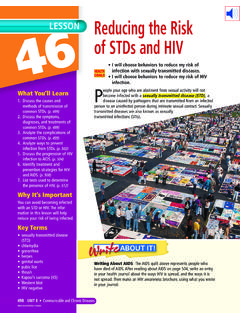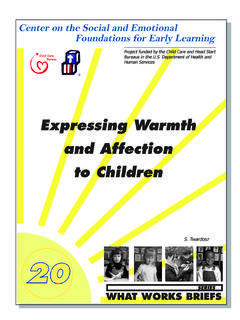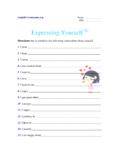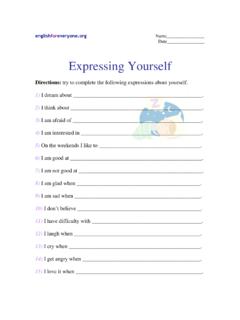Transcription of Lesson 10 Expressing Emotions and Managing Stress
1 Bob Daemmrich/Stock Boston Expressing Emotionsand Managing Stress I will express Emotions in healthful ways. I will use Stress -management someone asked you to write a top ten list of ways for teensto maintain optimal health. Your list might include Expressing emo-tions in healthful ways and having a plan to manage Stress . This les-son explains the link between anger, Stress , and You ll Learn1. Explain the mind-bodyconnection.(p. 95)2. Outline guidelines forexpressing Emotions inhealthful ways.(p. 96)3. Discuss hidden anger, angercues, and anger-managementskills.(pp. 97, 98)4. Explain the bodily changescaused by Stress during each ofthe three stages of the generaladaptation syndrome.(p. 100)5. Explain ways that prolongedstress can affect health.(p. 101)6. Identify life changes that aremost stressful for teens.(p. 102)7. List and discuss Stress -management skills.
2 (pp. 104, 105)Why It s ImportantStress is linked to many of the tenleading causes of death, includingheart disease, cancer, stroke, Terms emotion mind-body connection psychosomatic disease hidden anger hostility serotonin anger-management skills Stress general adaptation syndrome(GAS) Stress -management skillsWriting About Managing StressSuppose you are juggling a lot andyou are starting to feel really stressed out. One of your classmates tells youthat a good way to relieve Stress is to get some exercise. She urges you totry running track after school to blow off some steam. What would you do?After you read the information on Stress -management skills on page 104,write a response to this situation in your health 2 Mental and Emotional Health10 Aspecific feeling is called an You likely have experienced many Emotions ,such as anger, sadness, happiness, anxiety, or others.
3 Did you know that there is apowerful connection between your thoughts, Emotions , and bodily responses? Whatyou think and feel can affect what happens to your body, and what happens in your body canaffect how you think and to Know About the Mind-Body Connection 10 Expressing Emotions and Managing Stress95 The is therelationship between a person sthoughts, Emotions , and bodilyresponses. Consider the followingexample. Suppose you are worriedabout a test tomorrow. The emotion ofworry might trigger certain bodilyresponses, such as an increase inheart rate and blood pressure. If thiscontinues, you might have difficultygetting a good night s sleep. Youmight be tired the next day becauseyour emotional state triggeredchanges in your your emotional statecan trigger illnesses and disorders.
4 A(si koh suh MA tihk)is a physical illness or disor-der that is caused or aggravated byemotional responses. Suppose youhave an argument with a friend. Youare upset about what was said. Yourupset feelings might cause a head-ache or stomachache. Some teenshave chronic physical conditions that are aggravated by is a chronic condition inwhich breathing becomes difficult. Ateen with asthma might be fearful ofspeaking in front of the class. Whenthe teacher asks him to give a report,he might have difficulty emotional state aggravated connectionMake theConnectionInfluences on HealthFor more informationon influences onhealth, see page 35 in Lesson andstudying can be asource of Stress ,which can causechanges in the Source/SuperStock the emotion. What emotion am I experiencing? the source of the emotion. Why do I feel this way?
5 Whether or not you need torespond right away. Should I talk to a parent,guardian, or other responsibleadult about the Emotions I amexperiencing? Should I try to sort out my emo-tions by myself? How might my parent, guardian,or mentor respond? Do I need more informa-tion before I respond? Howdo I get the information Ineed? If I respond based on theway I am feeling right now,will I regret it later on? Do I need to rehearse whatI will say before I respond? a responsible and healthful response. What I-message might I use? For more infor-mation on I-messages, see p. 98. Would it be helpful if I discussed my feelingswith someone I trust, such as a parent,guardian or mentor? Would it be helpful to express my emotionsby writing in a journal? Could I write a poem, sculpt clay, or draw apicture to express my Emotions ?
6 Your health. Do I need extra sleep? Am I sleeping toomuch? Do I need to work off my strong emotionswith exercise? Do I need to dissipate my strong emotionsby spending healthful time with relatives orfriends? Am I aware of any physical disorders thatmight be connected to the emotionalresponse I am experiencing? If so, I mayneed to see a physician. Am I able to function in daily activities? Ifnot, I may need to ask my parent orguardian about counseling. What healthful outlets can I use to help medeal with my Emotions ? How might I deal with this emotion in thefuture?David Young-Wolff/PhotoEdit 96 UNIT 2 Mental and Emotional HealthHow well do you express your Emotions ? When you express your Emotions , are youractions responsible? Do you think about protecting your health when you experiencean intense emotional response?
7 Review the five guidelines that appear below forexpressing Emotions in healthful ActivityIdentify five characters in yourfavorite television shows that were involved in some sort of emotionalsituation. When faced with a problem, how did they react? Did theyexpress the Emotions in healthful ways, or did they lash out at others?Write an entry in your health journal about how you would havereacted in the situations they faced. Discuss your answers with feeling of being irritated or annoyed is called Anger usually is a response to being hurt, frustrated, insulted,or rejected. An anger triggeris a thought or event that causes a person to become angry. An anger cueis a body change that occurs when a person is angry. Anger cues are an example of the powerful mind-body to Know About Hidden Anger and that is not recognized and isexpressed in inappropriate ways iscalled The followingtypes of behavior may be signs of hid-den anger: being negative, makingcruel remarks to others, being sar-castic, procrastinating, or blowing you have hidden anger, you mayexperience anything from tense facialmuscles, stiff or sore neck and shoul-der muscles, ulcers, or headaches tohigh blood pressure.
8 Stress also mayhave a role in development of sometypes of teens are always chronic state of anger is calledHostility is a physical statethat places the body at greater risk ofdeveloping severe illness. The per-son s body is in overdrive and getsvery little rest. The person s immunesystem, the body system that fightsdisease, is who exhibit hostility havelowered brain serotonin a chemical that isinvolved in controlling states of con-sciousness and mood. Teens with lowered brain serotonin levels canbecome very with hiddenanger may expresstheir anger in blamingothers for actions or events forwhich they are not the releasing ofanger on someone or something otherthan the cause of the anger. For exam-ple, a teen might be angry at a parentbecause the parent would not let themattend a concert.
9 The teen might dis-place their anger and get into an argu-ment with a friend. The teen mightnot be angry with the friend, but takestheir anger out on the teens don t know they havehidden anger. This Lesson can helpyou recognize hidden anger and learnhow to express your anger in health-ful 10 Expressing Emotions and Managing Stress97 Symptoms of Anger rapid breathing increased heart rate rise in blood pressure increased sweating fromsweat glands in the face sweaty palms dryness of the mouth increased alertness decreased sensitivity to pain increased muscle strength asa result of increased avail-ability of blood sugar to themuscles tensed eyebrows pursed lips reddening of the face(tt)Photodisc/Getty Images, (b)ThinkStock/Getty ImagesIt is not harmful to feel angry. Feeling angry is a normal and healthful responseto some situations.
10 However, to protect your health and your relationships it is important to control anger and to express anger in appropriate healthful ways to control and express to Use Anger-Management Skills Anger-management skillsKeep an anger self-inventory helps youprocess your anger. Answer the fol-lowing questions when you experi-ence anger cues: What symptoms areyou experiencing? What are the pos-sible causes of your anger? Has youranger been growing over time? Isyour anger justified, or are you over-reacting to a situation or person? Ifyour anger is justified, examineappropriate ways to express self-statements to control are words a personcan say to himself or herself whenexperiencing anger triggers and examples of self-statementsare I can manage this situation. Iwill take a few deep breaths before Isay anything, or I ll just count to ten.
















